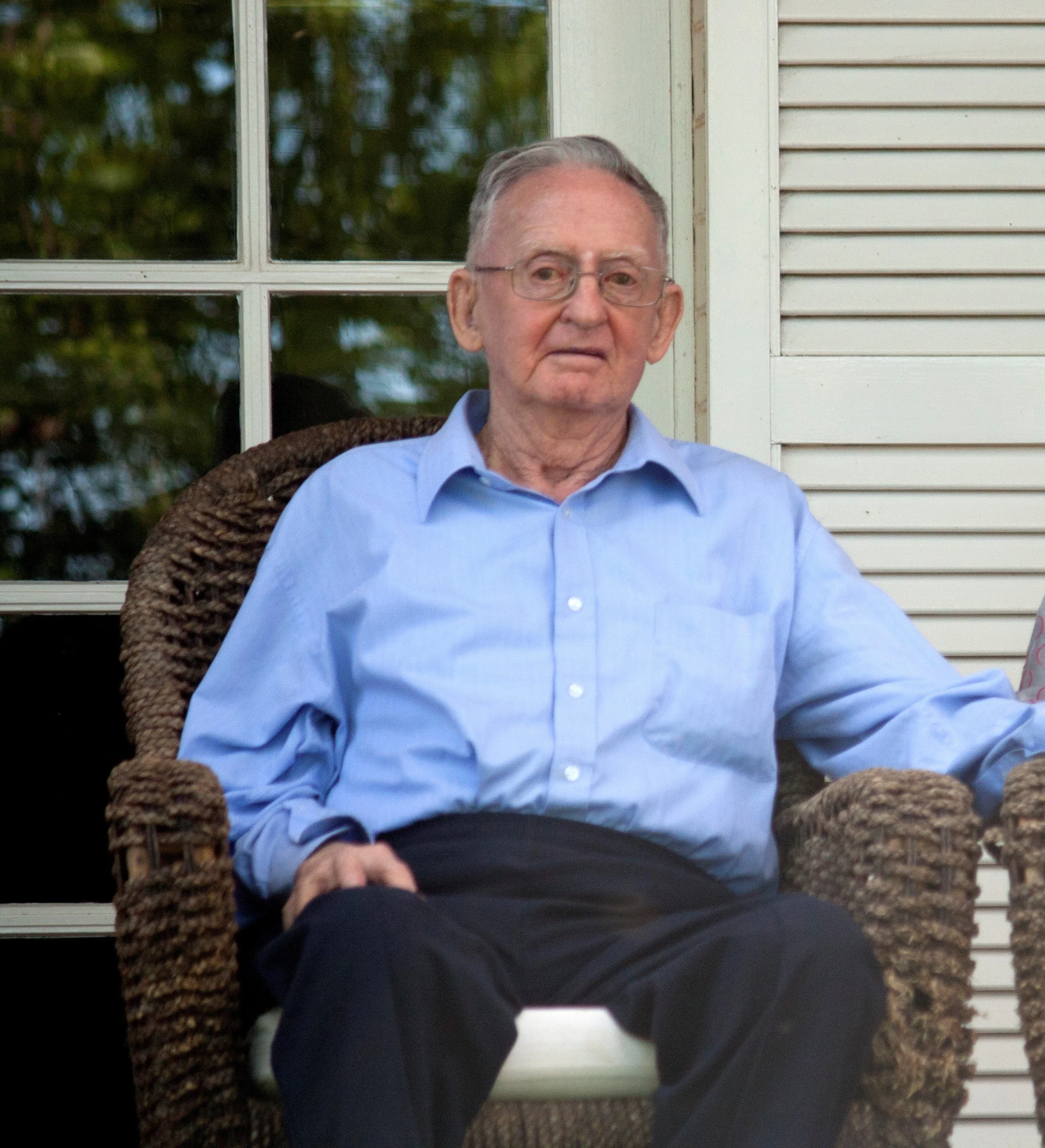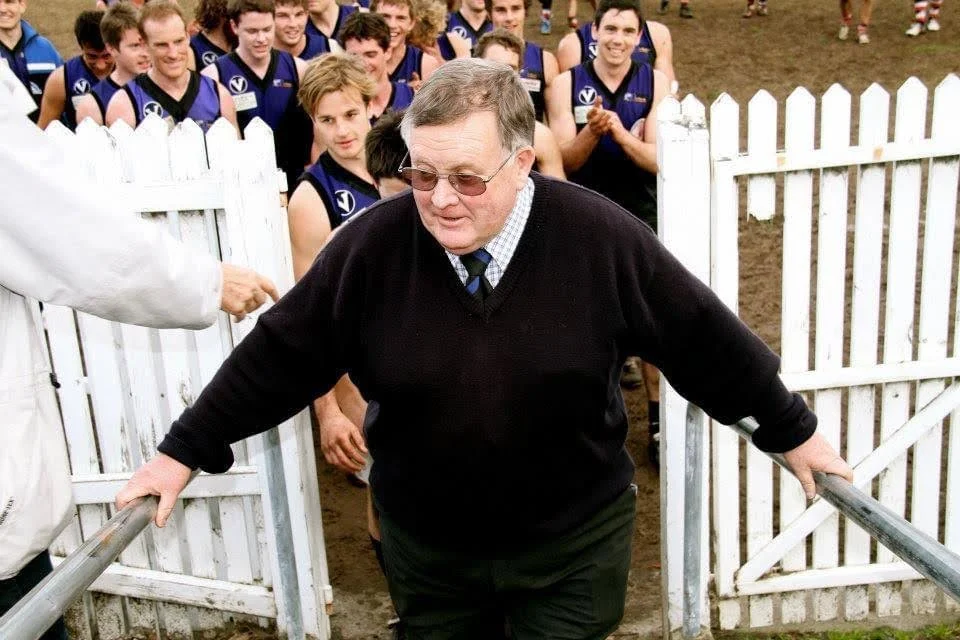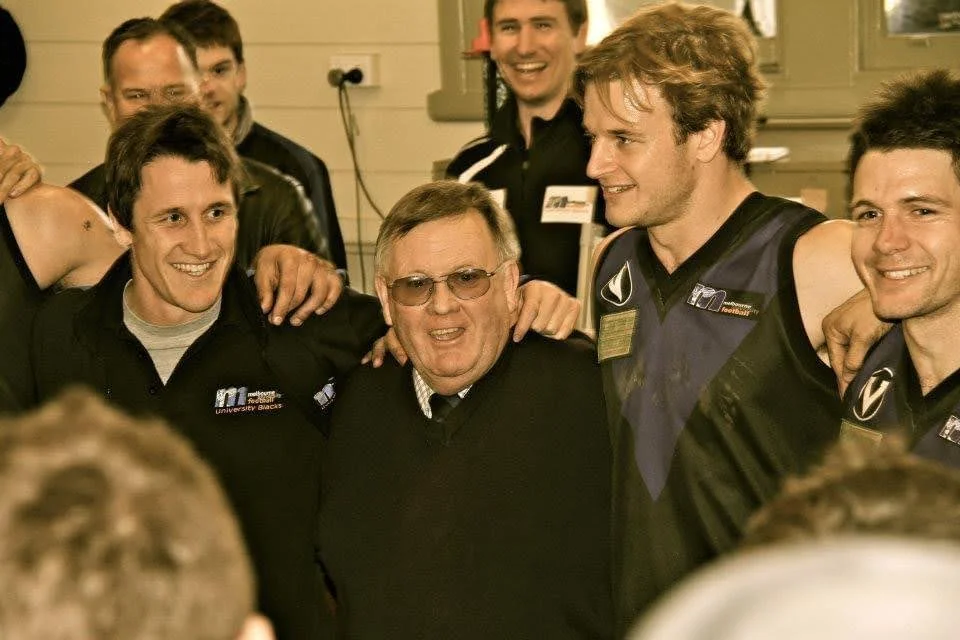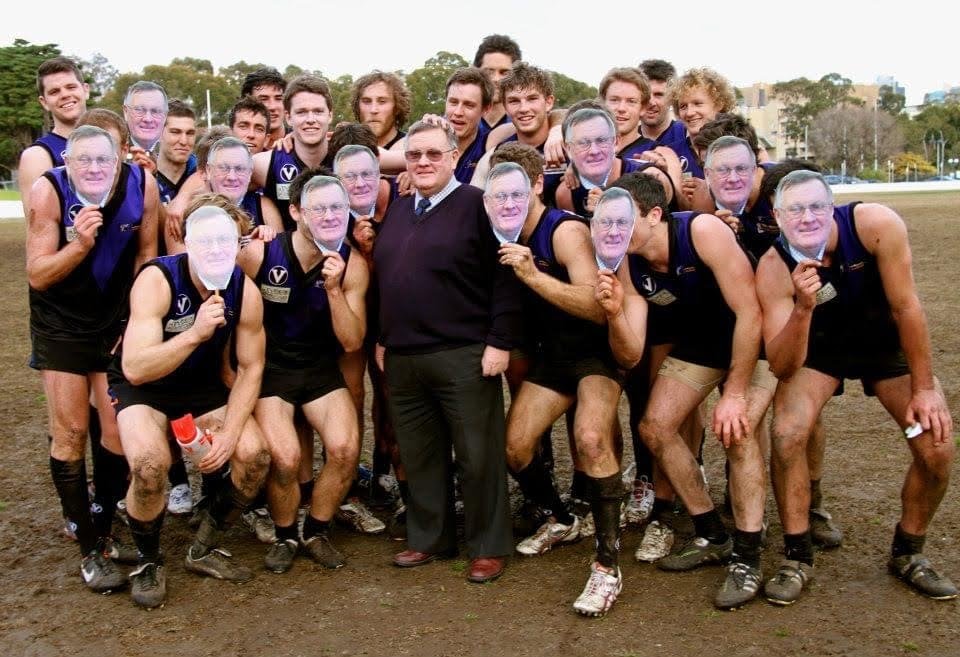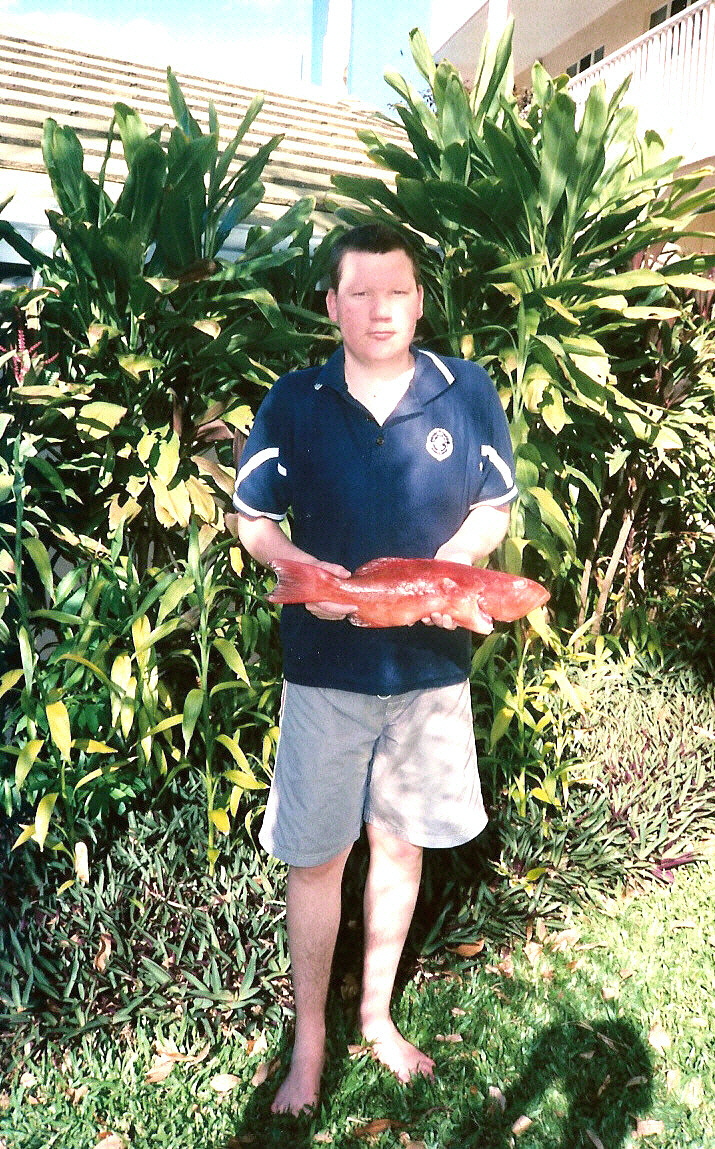19 May 2014, Melbourne Cricket Ground, Melbourne, Australia
Tommy was pretty lucky to kick a goal with his first kick in AFL football, because it was the only goal he kicked.
I can remember Tommy turning up to my daughter Cara's engagement party, and he turned up in just in a pair of shorts. No shoes, no top. And my son-in-law said to him, 'aren't you wearing a shirt, Tommy?'
He said, 'I didn't think it was formal'.
Now for those that don't know, Tommy drove a Jeep, D'you know that? He drove a Jeep. He drove a Jeep, all over the country. He didn't buy a Jeep, he drove a Jeep. He shot a commercial for Jeep, and the deal was that he’d get a new Jeep every three months.
Jeep figured that a man over eighty would drive to church on a Sunday, and maybe pick up the paper.
Jeep figured that after three months, it would have fifteen hundred ks on the clock, and would be sold as a new car.
Jeep didn't figure that after three months, that it would have eighty four thousand kilometres on the clock, and would be sent to the wreckers.
Tommy drove a Jeep alright, to every football club and netball club in the land.
He had some favourite sayings; 'If you want loyalty, get a dog', That was to all the football committees that sacked him.
'You'd run faster if chased by a crocodile', that's what he used to say to players when he thought they could run a lot faster than they were on the field.
He always answered the question, 'how do you like your tea, Tommy?' with, 'Hot and strong. If not I'll send it back', and he did.
'He's so slow he couldn't catch Humphrey B Bear'. That was a player that just couldn't run.
And of course, 'Sensational, but getting better' was his favourite one.
Tommy actually thought that getting up at five twenty in the morning and walking across the road in his Speedo's, swimming across Port Phillip Bay and back, in icy water, and then running ten ks, followed by a thousand sit-ups and a thousand push-ups was a great way to start a day.
He didn't convince me, nor many of his friends.
And then of course, he saw himself as a beach inspector, because then he'd walk along the beach to pick up syringes. His record was thirty eight in one day, he was really proud of that record. No gloves, just put 'em in the towel.
His first training session at Richmond as coach was two laps of the ‘Tan. He said 'Do your best' and off we all went. We never saw him again. Except for the several players he lapped. Those he lapped, please put up your hand in this room. The next training session was ten 440s with sixty seconds break in-between, and then the third one, which was on the Friday night (we trained the Monday Wednesdays and Fridays) the third training session was twenty 200s. Twenty 200s, I should say, with a sixty second rest.
Tommy ran them all until he absolutely dropped because you had a little chunky legs and he ran those four-hundreds, and that's where the legend was made, and everyone at the club said, well how good is this. Because all of a sudden you had this coach who turned up and he's beating everyone around the ‘Tan, and he's beating everyone in the four-hundreds, and he's beating everyone in the two-hundreds. I mean, it was quite remarkable. And the legend was made.
You know, nothing much has changed in football, Tommy's first game as coach of Richmond was against Carlton at Princes Park. And the siren didn't work at the end of the game. So, nothing has changed in football.
And they couldn't find the cow-bell to actually ring.
We believe to this very day -- just a Carlton conspiracy. The game actually continued on, and a policeman on his horse charged out onto the ground to alert the umpires that the game had ended. Richmond full back was a young man called Billy Walford, I played with him in the under nineteens, he was playing full back that day in just his fourth game of AFL football, recalls that he had to run around the horse to actually contest the ball. That should have alerted the umpire that the game was over. The Tigers won by six points, and of course, the Hafey era began.
That game was the start of the clubs golden era of premierships, '67, '69, '73, and '74. When a little club, of course, hadn't played in finals for twenty four years and Tommy took over, with a bunch of very experienced players in Roger Dean and Neville Crow and Mike Patterson andBull Richardson -- Freddy Swift, of course was there -- and a bunch of young kids came up from the under nineteens. A lot of us came up and then he went out and recruited of course, Royce Hart came across from Tasmania, Barry Richardson from Saint Pat's College, Michael Green, of course, also in the under nineteens came down from Assumption College.
And then in 1967 against a very very formidable Geelong side, which at that stage had the likes of Polly Farmer and Doug Wade, and Billy Goggin and Gordon Hynes, Kenny Newlands and Sam Newman, I mean they had a fantastic side, they were a team of champions like they are today. And Richmond of course, did not have one player who had actually played in any final until that final series. And in that grand final, Richmond won its first grand final in twenty four years against Geelong.
And then of course it carried on in '69, '73 and '74 and Hafey's Heroes were born.
I had the best seat in the house, of course, at Carlton, when he coached his first game, because I was 19th man, so in those days you sat next to the coach. I told him at half time that he didn't have a clue, for I was the greatest rover in the game and I was on the bench. I was eighteen at the time. He ignored me and the following week he dropped me. Should've kept my mouth shut, I reckon.
Most Saturday nights there was a function at Tommy and Maur’s, which was fantastic, Tommy believed in keeping everyone together and it was always at Tommy's and Maur’s. He'd go out and buy the Kentucky Fried Chicken or the Fish n Chips. The players could have a drink, there'd always be a cup of tea on of course around the kitchen.
He would say, of course, at training on the Thursday night, 'there's a function on at my place, it's not compulsory, not compulsory to attend’, he always made that point, ‘not compulsory to attend’, but if you didn't, you won't be selected the following week. There was always a rider, and it was always a packed house, at Tommy and Maur’s.
Tommy was proud that every birthday and every twenty-first, engagement and wedding was a club function, he prided the club on that, that it was a club function, because that's what he thought football was all about, getting the players together, and the wives, and the girlfriends, getting all the kids there, because he felt if you had a happy club, you're going to have a very very good football club.
And that's what Richmond was.
Tommy shaped our lives, he was a father figure and mentor, he was an advisor, and he was a conduit that actually joined us all together.
Tommy's time at Collingwood was an extraordinary one when you look back at it. Wooden spooners to a grand final draw in 1977 was incredible.
I can remember when Tommy rang me and told me he was going over to Collingwood, I was so upset and disappointed that he'd decided to leave Richmond. He rang me and said he was going to resign as the coach of the Richmond Football Club, which to me and I said, ‘Well reconsider, because the players love you,’ and he said, ‘No, I have to move on.’
So it was with great disappointment when he did. But he took Collingwood from wooden spooners to that grand final, and Tommy still maintains they would have won that if the great Phil Carman had've been able to play after being suspended, I think, against North Melbourne. He'd kicked five goals in both games they played that year. So he was a mighty loss and they drew that first grand final, and lost the second one.
Of course, in total, five grand finals in his first five years including that drawn grand final, and then he was sacked.
We had a lunch date at the Commonwealth Cafeteria, we had lunch three times a week for ten years -- Mondays, Wednesdays and Fridays. Tommy would always drop in and we'd have lunch at the Commonwealth Cafeteria, 'cause I worked at Telecom, well, I attended Telecom. I became very good at darts and chess and so Tommy would drop in and we'd have lunch at the Commonwealth Cafeteria on the twelfth floor at the top end of Spring Street.
He came to my work on this particular day and I said, 'How're ya going, Tom', and he always said 'Sensational, but getting better', and he said, 'but there has been better days'. And I said, 'Why's that, Tommy?' and he said, 'I've just been sacked as coach of Collingwood’.
He was shocked by that because he had a phone call to come down to the Club, and he went down to the Club and he expected them to say ‘keep going,’ they'd started the season pretty ordinary, ‘keep going, we're a hundred percent behind you, you've done a mighty job.’
But, he was sacked.
And he came to my work, and when he told me that I said to him, 'Well, let's forget lunch, you've probably got so many things on your mind'.
He said, 'Don't be crazy, lamb roast is on the menu today!’
So we went up to the top of the twelfth floor of the Commonwealth Building and there we were having lamb roast and I kept thinking to myself, the biggest story in football is about to break, and here's Tommy having lunch at the Commonwealth Cafeteria -- because he had this great ability to just move on. Just move on. He didn't believe in rejection at all, and was already looking forward to the future.
He loved his time down at Geelong and it was great to see Bruce Nankervis here today, the only person I ever got reported for striking in AFL football. So it’s great to see Bruce, it was an accidental king-hit, too, Bruce, I'm sorry about that.
But he did love his time down at Geelong, by the sea. In his first game as coach of the Cats, Gary Ablett Senior played his first game for the Cats on a wing, and booted four goals.
Everyone's entitled to an off-day, even Gazza.
In the centre, playing his first game was Greg Williams.
Greg Williams had written a letter to Tommy, asking him to give him a chance. He'd been rejected by Carlton, and he'd been a great player up in Bendigo, but for some reason he wrote this letter to Tommy saying that he was slow, he was small, probably had attributes that some people didn't like, but he said he could win the ball a lot, he could pass it off, he’d like to be a team person, and he liked to bring other people into the game, and he begged Tommy for a chance.
And that's how he got down to Geelong. Tommy answered the letter, got him down there and Greg Williams lined up in the centre in that very first game Tommy coached down at Geelong.
And on the other wing, of course, was the great Michael Turner. Not a bad centre line. Abblett, Williams and Turner. Second only to ... you know who. Bourke, Barrett and Clay.
In Sydney, he did great things, Tommy, in Sydney.
I don't think he quite gets the recognition that he deserves in shaping the national game.
He became coach in 1986, was a great admirer of Geoff Edelston, I know he has a lot of critics, but Tommy said he was absolutely fantastic, in the way that he helped generate interest up there in Sydney.
And with a group of players that went up there, Greg Williams followed Tommy up to Sydney, Gerard Healy, Bernard Toohey were some of the guys that went up there, Geoff Edelston, always, Tommy speaks so highly of.
He became coach in 1986 after the Swans had finished tenth the previous year, in a twelve team competition. Not easy up in Sydney then, as you know, not even easy today.
In his first year he had Sydney rocking and rolling, and finished second after the home and away season. Which is not a bad effort. Second on top of the ladder. He drew crowds of forty thousand to the Sydney Cricket Ground, can you believe that, in 1986, and forty thousand people went to Sydney Cricket Ground to see Sydney Swans play Hawthorn. And thirty eight thousand turned up to the SCG when they played Carlton.
These are massive figures. This is in the mid nineteen-eighties, could you imagine, even today those figure would stand up and people would be thrilled.
In 1987, the Swans in round sixteen, versus West Coast, Sydney kicked 30.21. In round seventeen, the next week, versus Essendon, his team kicked 36.20. And in round eighteen, the very next week, against Richmond, they booted 31.12.
So, thirty goals, thirty six goals, and thirty one goals. He had Sydney rocking.
What a way to play football. Three weeks of football the likes we've never seen before or since, was when Tommy, of course, was coaching the Sydney Swans.
The following year, the Swans finished seventh, now that today, gets you into the finals.
Back then it got you the sack. In fact today, if you finished seventh you might get a three year contract extension.
Since then of course, he devoted his life, he's inspired and motivated children, young adults around the country, and those in industry.
Tommy started that when he was down at Geelong, there was no full time coaching in those days, so what he did was, to fill in his time, and he thought it'd be great for the Geelong Football Club, to get out there and promote the club, that he would travel around to all the schools in Geelong, and talk to all the kids, as the family has mentioned.
He loved that, it was fantastic. And you heard those great stories, but he wanted to do that. One, you could follow Geelong, and two, he thought it'd be great to educate the kids on living a good life.
Tommy related stories of course, of AFL players, to everyone at every talk, every speech he made. Because he didn't believe in rejection at all, it was just to motivate you to actually go on to do bigger and better things.
He related stories of AFL players being cut from their clubs and then went to other clubs to win Best and Fairest awards, Brownlow medals, win premierships, become All-Australians and captain their clubs. He had a list as long as his arm that he could give some demonstration to kids, to say, if you got knocked back, don't worry about it, pick yourself up, dust yourself down because I've just told you of all these guys who've gone on and done great things.
And he also loved telling about cricketers who left their State, batsmen and bowlers and wicket keepers who went to another State, and then of course, went on to play for Australia in test cricket.
He loved that, he loved those stories. Because he felt they were uplifting.
Tommy of course, lived in Canberra for a period of time, as we know, and played rugby league up there as a young boy, and then when he went to Sydney, he really embraced Rugby League. And he got a lot of the Rugby people around to take training and also for tackling and that was one of the strengths of all Tommy's sides, was tackling.
He only had one player that never tackled, that was me. But, it was impossible for me to tackle because I had the ball all the time, so...
But he used to get it in for the other players, and he did that up in Sydney and the idea was to make them the strongest tackling team in the business, so he loved rugby league, he loved it. He loved Australian Rules Football, it was always number one, but he loved the toughness of the people in rugby league. He loved the way that they went about it, he loved their character.
Just recently I was visiting Tommy in hospital and Craig Bellamy was there. He coach of course, of Melbourne Storm, he loved Melbourne Storm, what a fan he was of Storm, and CEO Frank Ponissi was there as well.
Great friends of Tommy, and they came in to see Tommy.
And Tommy was in bed and I just thought I'd wind him up a bit by saying to Craig Bellamy there in the company of Frank Ponissi as well, I said, 'How do you rate Billy Slater, Tommy?' And he said, 'Billy Slater! Billy Slater would win the Brownlow medal in his first year of AFL footy, he could open the bowling for Australia, he could beat Usain Bolt at the Olympic Games, and he could ride the winner of the Melbourne Cup.'
I think it's fair to say he had a high opinion of Billy Slater.
Tommy loved setting himself goals, we heard the girls talk about this before, you know, silly ones, I used to say to him, 'you're crazy', 'you're silly', 'why wont you have a cake or biscuit?', because forty five years ago in a New Years resolution he got up and said ‘I'm not going to eat cake and biscuit any more.’
I mean, how stupid is that? Then he decided that he wasn't going to eat sweets for the last thirty five years, he hasn't even eaten a sweet. And of course, we heard the girls talk about it, he told me, he said, he rang up the start of this year, I had New Years Eve with him, he said, 'I'm going to read twenty books this year, twenty books, that's my goal', Twenty books. Always sporty books of course, nothing too heavy, always about sport, and people who'd done great things.
He said, 'I'm going to try ten new restaurants this year,' that was another thing he wanted to do, always had to go to ten new restaurants, didn't mean that he didn't go to the old ones, he did eat mainly at Dimattinas, I will say that. Frankie was always very kind with the bill.
Then of course, he had to go to five concerts, five new concerts a year, that was important to him. Five new concerts. Had to go watch people sing, loved it when it was down at the Palais there, and they had the local Go Show was on there recently, and back to the rocking and rolling from forty five years ago. His great mate Danny Finley was there of course, with MPD, ‘Mike, Peter and Danny’ -- managed Tommy for so many years and did a marvellous, marvellous job. When Tommy was at Collingwood, at Sydney and at Geelong, and he was a life-long friend, and Danny of course, was a famous drummer in ‘Mike Peter and Danny’, MPD, Little Boy Blue, Little Boy Sad, I may even sing a few bars if I keep going ...
But, he loved to go to concerts, he loved music and we heard it before, his beautiful granddaughter Sam, singing a marvellous song.
And of course, the other thing he loved to do was ring everyone in Australia, that's what he loved.
No matter where he went, around the country, for some reason, Tommy had this, this memory where he knew where every former player lived, every former player resided, so if was giving a talk somewhere, he'd go fifty ks out of his way because he'd knock on somebody's door and he'd say, 'You won't believe who I saw the other day', and then away he would go.
He would do silly things, in actual fact, he would do things like -- he was a workaholic, he did love talking to people all the time. He had to meet people, he had to be there in their company.
He'd go to Mildura and I'd say, 'What are you doing this weekend, Tommy?' and he'd say, 'I'm going to Mildura.' I'd say, 'that's great',
'On the Monday,' and then, 'I've got to get up very early Tuesday morning 'cause I've got to drive to Shepparton for a dinner, a luncheon there at Shepparton.'
I'd say, 'That's fair way, Tommy', 'Oh no, she'll be right', so then I'd say so what then, home?'
He'd say, 'No, I've got a function in Mildura.'
I used to say, 'Tommy if you're in Mildura, and you've got to drive all the way to Shepparton, I mean it's a bit difficult to go the whole way back to Mildura, isn't it?',
'No, no, no, no. She's fine.'
Of course, he was a shocking driver, as everyone knows. Shocking driver.
He got pulled up once, out the front of Punt Road, got pulled up by the (police), he was sitting at the lights -- Tommy drove very very fast, by the way, very fast. He was sitting at the lights, and he was looking in his rear vision mirror, and he was very late for a speaking engagement. And he was at the lights, waiting for the lights to change, and then he took off. He knew the police car was behind him. The police car, very quickly put on their siren and pulled him over. And Tommy was in a hurry.
So the police pulled him over, and as you know, when they pull you over, they sit in their car for a short period of time. Tommy was pulled over in his car. But unlike most people who sit in their car, he jumped out of his car, he ran back and he said, 'I'm in a hurry, what's going on?'
And they said, 'Well, you were travelling too fast'
He said, 'That is rubbish!' he said, 'I saw you in my rear vision mirror, I'm not going to take off and break the speed limit when I can see you in my rear vision mirror!' he said. 'That's rubbish!'
The bloke said, 'Well we clocked you doing seventy five ks.'
And Tommy said, 'Check it out, it's wrong!', and ran back, jumped in his car and took off.
I said to Tommy, 'What did they do?' He said, 'They just sat there in amazement.' Just took off!
Tonight, on behalf of Tommy, I'd say, go home, do five push ups, have five sit ups, go for a walk or go for a jog, and say “sensational, but getting better”.
And always remember, Tommy drove a Jeep.

